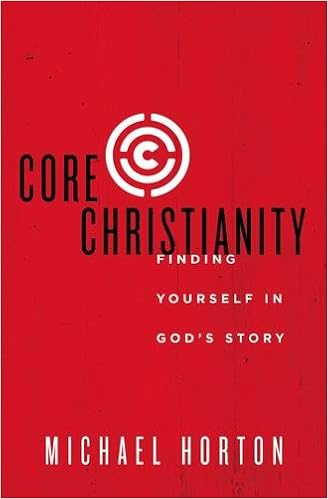
Core
Christianity: Finding Yourself in God’s Story by Michael
Horton
Popular author and theologian Michael Horton has
written another timely book on the impact of Christian theology for the life of
every Christian. Beginning with the 4 D’s;
drama, doctrine, doxology, and discipleship, Michael charts a way that
integrates knowing the Christian faith, experiencing that same faith, and
acting it out in the culture in which we live.
In turn, what you have in this book is a sort of apologetic of how and
why theology makes sense for all of life, not just in some cerebral narrow
sense. This new book, Core Christianity,
is an examination of the crucial doctrines of the Christian faith for the purpose
of bringing God glory and his creatures obedience to Him.
Uniquely, Horton starts his book out with a chapter
on the deity of Jesus Christ. Drawing on
the testimony of Jesus’ words, his death, the empty tomb, and eyewitness
testimony about Him, Horton finishes the chapter with the question of Jesus to
us, ‘Who do you say that I am (37)?’
With an adept number of historical references (Josephus and ancient
Christological heresies) and drawing on the liar, lord, or lunatic argument set
forth by C.S. Lewis, Horton draws us into the impossibility of taking Jesus as
some quasi moral teacher but calling us to consider his claims. While I’m not generally sure why a book on
finding on story starts with the deity of Jesus Christ, I’m glad that he
started there for none other than the reason that without Jesus the story makes
no sense at all.
One of the most beautiful and careful handling of
Scripture comes in chapter 4 (God speaks).
After cataloging how various strands of believer’s use the Bible, Horton
writes, “The scope of Scripture therefore is God’s commands and promises – law and
gospel – centering on this unfolding plan in Jesus Christ…Instead we must allow
Scripture itself to identify its scope and purpose (77).” How does Scripture direct us? For one, we must look at the natural sense of
each passage, discerning its genre (poetry, apocalyptic, historical narrative,
etc.) and then look at the covenants, whether they are promise based covenants
or not. This canonical approach to
Scripture sets limits on our interpretation but also challenges us to see the
God of Scripture rather than simply daily nuggets of joy for today.
With characteristic wit and wisdom, Michael Horton
gives us an account of the breadth and scope of redemption, the final
judgments, the sacrifice of Christ in connection to OT sacrifices and finally
helps us understand how these pieces of the puzzle fit together. Though you won’t find any necessarily novel
or new in these pages, you will find a rich theology that one can preach but
also that one live out in the created world we live in.
Thanks to Zondervan and BookLookBloggers for the
copy of this book in exchange for an honest review.
Comments
Post a Comment